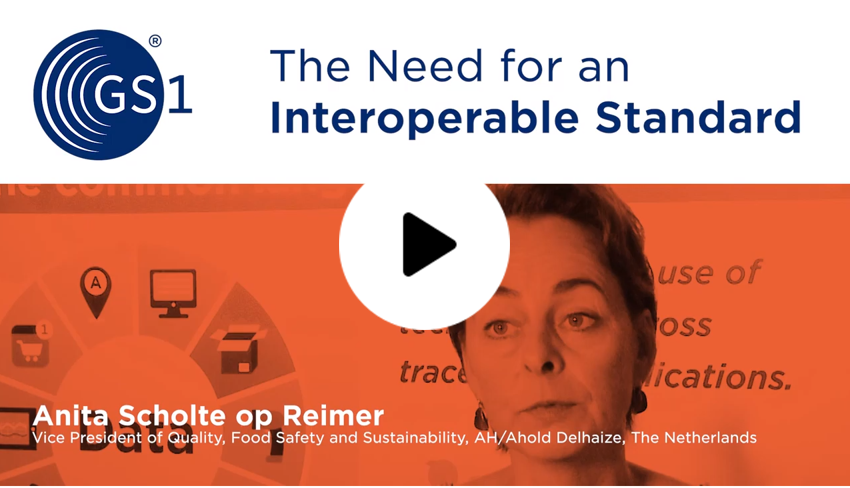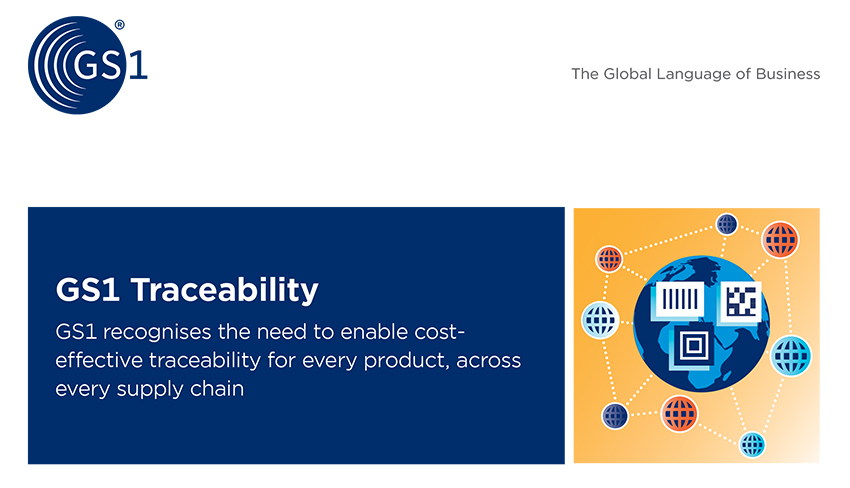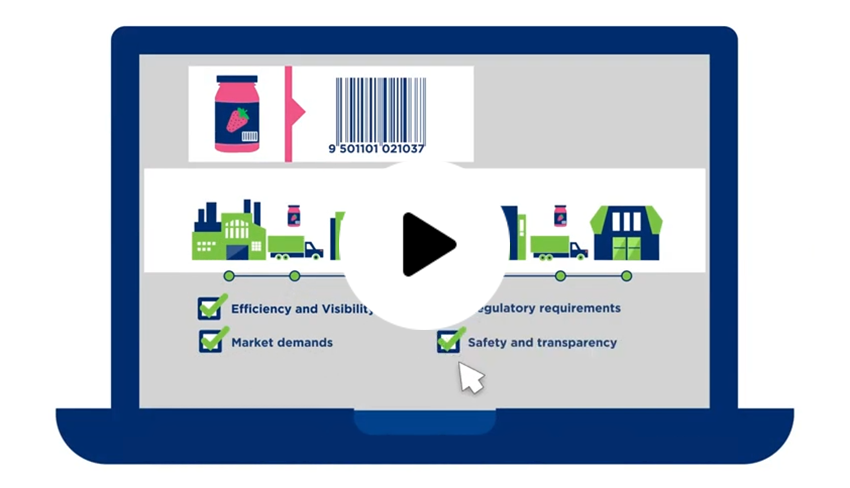Traceability
GS1 standards serve as the universal communication protocol for traceability solutions worldwide, facilitating seamless exchange of information among over one million businesses. Operating in over 100 countries, GS1 offers both global guidelines and local support to ensure that traceability systems are interoperable and scalable. This enables trading partners to efficiently collaborate and share data across the entire supply chain.
The Need for Traceability
As product supply chains expand globally, there's a growing demand for more information from trading partners, regulators, and consumers. This complexity is fueled by industry needs and facilitated by standards like GS1, allowing for interoperability. As supply chains become more intricate, traceability becomes crucial for tracking raw materials to the final product destination. It enhances visibility throughout the supply chain, forming the foundation for quality and risk management systems.
Enhancing Supply Chain Resilience with GS1
In today's interconnected global trade and complex supply chains, both traders and consumers seek more than just basic tracking updates for their orders. They're increasingly interested in the origins and characteristics of the products they purchase.
Questions about sustainability, safety, and ethical production practices are becoming commonplace.
This shift underscores the importance of comprehensive traceability solutions.
In this regard, GS1 plays a crucial role by providing standards needed to meet these evolving demands!
Traceability Requirements
Implementing an effective traceability system entails adhering to several crucial rules. Standardization is key for seamless integration, while achieving end-to-end visibility demands meticulous data tracking. Accuracy and consistency are vital, as is collaboration among supply chain partners. Robust risk management and compliance with regulations are essential, with continuous improvement ensuring system responsiveness to evolving needs and challenges.
GS1 through its Standards provides a global framework ensuring that traceability systems are interoperable and scalable, allowing trading partners to easily collaborate and share information across the entire supply chain.
Advantages of Traceability Systems:
- Enable targeted and effective recall of dangerous products from the market.
- Inform consumers about key product attributes, such as allergenic food ingredients.
- Combat counterfeiting and safeguard brand integrity.
- Essential component in regulatory compliance and safety standards.
What is Traceability?
Traceability is the ability to track and trace the history, location, or application of an item through documented records. It involves recording and maintaining information about the origin, production process, distribution, and destination of products or components within a supply chain.
GS1 Standard about Traceability
The GS1 Global Traceability Standard is a set of guidelines and procedures established by GS1 to facilitate traceability throughout the supply chain. It outlines the minimum requirements for tracking the movement of products from their origin to their destination, independent of specific technologies or implementation systems. This standard ensures interoperability and consistency across different industries and regions, allowing trading partners to share information effectively and enabling targeted recalls or product tracing in case of emergencies. The GS1 Global Traceability Standard is based on the utilization of GS1 standards for product and location identification, barcodes, RFID technology, and information exchange standards.
![]()
Would you like to assess your company's traceability capabilities?
You can accomplish this by utilizing the GS1 Global Traceability Compliance Criteria Standard.
This document describes the criteria for full chain traceability, providing a single process of meeting regulatory & industrial requirements using the GS1 standards.
GS1 Global Traceability Standard Summary
The GS1 Global Traceability Standard (GTS2) introduces two pivotal concepts for interoperable traceability:
- Critical Tracking Events (CTEs): These represent the actual events occurring throughout the lifecycle of a traceable object, such as receiving, packing, shipping, and transporting.
- Key Data Elements (KDEs): These are the specific data elements that describe instances of CTEs.
GS1 identification standards, such as the Global Trade Item Number® (GTIN) and Global Location Number (GLN), uniquely identify objects moving within supply chains and their respective locations. These identification keys facilitate the connection between physical and information flows within an organization's processes and across different trading partners' processes.
Barcodes, EPC/RFID, data capture standards, and data sharing standards like the Global Data Synchronisation Network® and EPCIS (Electronic Product Code Information Services) enable automated processing and sharing of information among trading partners. EPCIS is particularly critical for traceability systems as it enables the sharing of information regarding the physical movement and status of products across supply chains.
Furthermore, GS1 provides sector-specific traceability standards tailored to various industry sectors such as Healthcare, Retail, and Rail. Companies can leverage these standards to achieve traceability across and within their respective sectors.
For those interested in assessing their current traceability capabilities, the GS1 Global Traceability Compliance Criteria standard allows companies to evaluate their traceability control points and implement best practices..
![]()
Benefits of Implementing the GS1 Global Traceability Standard
- Enhanced Product Safety: The GS1 Global Traceability Standard ensures that products can be tracked throughout the entire supply chain, enabling swift and targeted recalls in case of safety concerns or quality issues.
- Improved Efficiency: By standardizing traceability processes and data exchange protocols, the GS1 standard streamlines operations and reduces the time and effort required to trace products, leading to increased efficiency in supply chain management.
- Regulatory Compliance: The GS1 Global Traceability Standard helps companies meet regulatory requirements related to product tracking and tracing, ensuring compliance with industry regulations and standards.
- Enhanced Transparency: Implementing the GS1 standard enhances transparency in the supply chain by providing stakeholders with accurate and reliable information about the movement and status of products, fostering trust and accountability.
- Reduced Risk: With better visibility into the supply chain, companies can identify and mitigate risks more effectively, such as counterfeit products, unauthorized diversion, or product recalls, minimizing potential financial and reputational damages.
- Interoperability: The GS1 standard promotes interoperability among trading partners by providing a common framework for traceability systems, allowing for seamless information exchange and collaboration across different organizations and sectors.
- Improved Customer Confidence: By implementing robust traceability systems based on the GS1 standard, companies can demonstrate their commitment to product quality, safety, and compliance, enhancing customer confidence and loyalty.
Overall, adopting the GS1 Global Traceability Standard offers numerous benefits, ranging from improved safety and efficiency to regulatory compliance and enhanced transparency in the supply chain.
Projects Focused on Traceability in Greece.
GS1 Association Greece Role: Leading GS1 EPCIS critical events and GS1 Traceability Standard Implementation analysis.
GS1 Association Greece Role:Deliverable:Implementation Investigation and Analysis for the Application of GS1 International Supply Chain Standards in Processed Agricultural and Fishery Products’ Traceability Processes".Leading GS1 ID Keys - GS1 AIDC implementation, proposing project business KPIs based on APICS SCOR model.
GS1 Association Greece Role:Project Partner
A collaborative project between the National Technical University of Athens (NTUA), OPTIMUM SA, and GS1 Greece focusing on utilizing Blockchain technology to track and trace premium varieties of wines.
Deliverables .Mapping and analysis of GS1 standards, deployment of EPCIS (ISO/IEC 19987:2017) standard as events tracking traceability process; recommendations for future applications in wine and premium products traceability strategy
Journal Publication: AgriFood supply chain traceability: data sharing in a farm-to-fork case
For More information about Projects you can contact us at the Tech.support@gs1greece.org
Sector-specific traceability

The industry is urging for the adoption of GS1 standards to facilitate traceability effectively!
"The consumer is asking for more and more transparency and I think this is where in the end the solution will go to and where GS1 will play a crucial role."
Anita Scholte op Reimer
Vice President Quality, Food Safety and Sustainability, AH/Ahold Delhaize

GS1 Traceability

Enhancing supply chain efficiency and transparency through traceability.
GS1 standards improve the efficiency, safety and visibility of supply chains across physical and digital channels in 25 sectors.
FAQ
- The aim of the Standard is Not internal traceability, although it does show the inputs and outputs that must be linked by an internal traceability system.
- It's not a law or regulation per se, but rather a guideline crafted to aid businesses in meeting legal obligations.
- It doesn't serve as a substitute for a service provider, such as an application support specialist. Instead, it acknowledges the types of information and essential specifications considered by such providers when developing a traceability management system.
- It doesn't supplant safety and quality programs; rather, it complements them, particularly when issues arise.

Would you like to use GS1 Standards?
GS1 is the sole organization globally responsible for allocating universally recognized corporate code prefixes, enabling the creation of internationally valid Global Trade Item Numbers (GTINs) and Global Location Numbers (GLNs).
In Greece, GS1 Association Greece serves as the authorized body, established and managed by businesses utilizing GS1 standards. This association is entrusted with assigning codes prefixed with 520 and 521, ensuring consistency within the Greek market.







